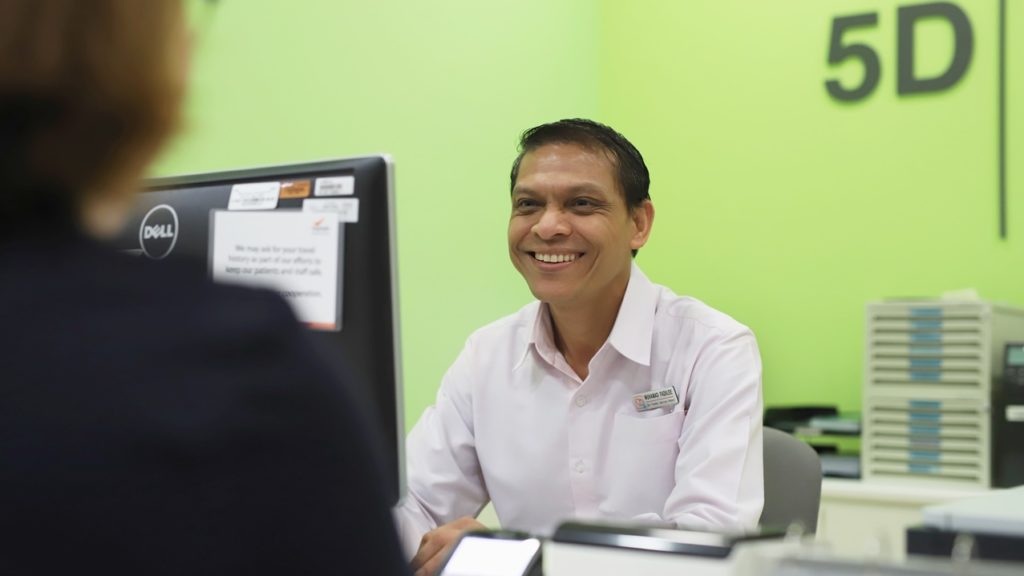When Muhamad Fazalee first joined the National Heart Centre Singapore (NHCS) as a medical records officer (MRO) in 2013, much of his work was manual in nature and took place behind the scenes.
His task was to make sure that patient records were retrieved from storage and delivered to the centre’s clinics at least two weeks ahead of the scheduled appointment.
Why two weeks? It was to cater to occasions when patients showed up at the clinics early and avoid the MROs having to scramble at last minute.
“I was an MRO for four years and in the first three years, the process was very manual and we would physically be retrieving and storing the patient files. That changed with the introduction of SMR, short for scanned medical records. This saw us bring the patient files and notes to be scanned so the doctors and nurses could now retrieve them from the computer system,” shared the 48-year-old.
The Impact of Digitisation
While digitising of records may have made work more convenient, MROs like Fazalee, who are employed as contract staff, felt uncertain of their job stability.
“As everything became paperless, there was less things for us to do. Files also became increasingly lesser and we were telling ourselves that as this reduced, what would happen to our jobs?
“We were nervous with the introduction of the scanned medical records system, and the possibility that our jobs would no longer be necessary. I did ask my superiors about what would happen to us when medical records went fully digital and they helped us by finding new roles. Some of us transitioned from the medical records office into new roles at the National Heart Centre’s call centre, clinics and other departments,” shared Fazalee.
Of the 25 MROs impacted by the changes, 12 are currently transitioning into other fulltime roles within NHCS. The Healthcare Services Employees’ Union supported them by helping to source for new placement opportunities and making sure that the redeployment went well.

New Challenges
In Fazalee’s case, his transition saw him take up a new fulltime role as a patient relations officer in November 2018 at NHCS’ Cardiac Radiology Clinic. There, he received a month of on-the-job training and mentorship from colleagues before being able allowed to work independently.
In addition to routine duties such as registering patients and fixing appointments, Fazalee also needs to be familiar with billing procedures, payment options and financial support schemes available to patients. He is also required to know about the different procedures administered in the clinic and medications.
“Some patients also will ask about medication and what they should or should not take prior to the procedures. While the doctors will explain this to the patients, we also need to be familiar with the list of medicines that patients are not supposed to take before their scans,” explained Fazalee.
Staying Positive
Describing his first day at the clinic like a first day at school, Fazalee shared how he took notes and kept track of everything he had to do.
“What I didn’t know, I’d ask and from there, I would slowly pick up the knowledge and understand how things worked. Even after a month of on-the-job training with a buddy, manning a counter on my own was absolutely nerve-wrecking.
“The most tedious part of the job was billing because of the various payment schemes available. We would have to carefully explain each and every one to patients to avoid any misunderstanding. My fingers would often tremble because there is a lot of toggling between different windows and pages to find out information,” added Fazalee.
Despite the struggle, Fazalee is staying positive. “Sometimes I will get angry at myself at work. But sometimes the best way to get over it is to not think so much about it. I will always tell myself that no matter how stressed I am, I must smile, because I am serving a customer. The patient is more important and they come first because without them, there won’t be work for us,” he said.
While it may be daunting to learn new things, Fazalee has this to say: “When you want to or need to learn something new, just do it. Don’t care about how hard it is or what people may say because it is for your own good, for your own future.”

